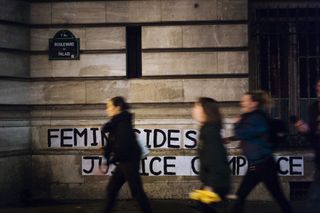
Report: French Police Failed to Stop 36 Men From Murdering Their Female Partners
The report comes amid a wave of protests against femicide in France, where men kill an intimate partner once every three days.

In 41% of cases in which men murdered their female partners, the French Police could have intervened and prevented the deaths, according to a recent report on femicide released by France’s Justice Ministry.
The report analyzed 88 cases of men murdering their partners, in 2015 and 2016, for which final judgments had been delivered. It found that 36 women had been in touch with the French Police prior to their murders reporting they feared their lives were in danger — but the police took little or no action. Without intervention, the men in these cases continued the abuse against their partners or former partners until they either escalated it to murder or caused such grievous bodily injury that it resulted in the women’s deaths, The Telegraph reported.
The report comes amid a wave of protests in the country against increasing femicide — the murder of women or girls — by husbands, partners or exes. Tens of thousands took to the streets recently to compel the government into taking concrete steps to combat the rising rate of deadly domestic violence, or what French President Emmanuel Macron called “France’s shame.” In 2019, 137 men perpetrated intimate partner violence (IPV), which resulted in the deaths of their “companions or exes.” That is already 17 more than in 2018, according to figures collected by the collective Femicides by a Partner or Ex. An AFP examination of every femicide case in France this year highlighted repeated trends, especially authorities failing to act on warning signs of the violence.
For a big-picture-view, a man kills his female partner every three days in France, the country with the highest number of femicide cases in Europe; 22,000 men perpetrate marital violence — physical or sexual — against women every year.
According to the United Nations (UN), 35% of all women across the world have been sexually and/or physically abused by their intimate partners, of which men fatally injured 13% of the women. In 2017, nearly 30,000 men intentionally killed their female former or current partner. In India, the situation is abysmal; at a rate almost as high as the world average, one in three men abuse their partners at some point in their marital lives. So, the widespread nature of this particular kind of violence against women is not new news.
Related on The Swaddle:
The Effects of Spousal Abuse Can Linger Long After the Violence Stops
But, in the particular case of France, the renewed spotlight on IPV has highlighted a crucial broken link in law and order and judiciary across the world — the safe spaces created by democracies for survivors of IPV to seek asylum, dignity, and support. The French Justice Ministry’s report brings this flaw in the system to light: “The criminal justice system is not satisfactory. This report points out difficulties and dysfunctionalities,” Nicole Belloubet, the Justice Minister said at the launch of the report, The Telegraph reported.
The report came at the heels of a visit by President Macron to a domestic violence hotline center. As he sat there, silently listening in on calls between IPV survivors and hotline operators, he caught a glimmer of ground reality when he overheard a police officer blatantly refusing to”intervene” and help a woman whose husband was threatening to kill her after escalating years of abuse, The Guardian reported. She was at the police station, but the police refused to accompany her home or take the man into custody for questioning. To make matters worse, the police officer wrongly informed the woman that he would need a judicial order to take her to her house and ensure her safety. The telephone operator then told Macron this happens “more and more frequently.”
With the AFP investigation confirming this trend — that police either don’t take women’s complaints seriously, think it’s not their place to intervene in “domestic matters,” or do not have the training to adapt to such time-sensitive, complicated situations — Pandora’s box has been opened in France. The people are forcing the state to recognize how it’s failing half its citizens by neglecting the deeply-rooted rot in the criminal justice system. It’s not just the police; according to the country’s Justice Ministry’s report, 80% of all cases of domestic violence between 2015 and 2016 were dropped by the public prosecutor. That is, the state, which is supposed to defend the victim against the accused, simply dismissed the allegations unilaterally, without consulting the survivor.
Institutional apathy exists worldwide. The people who make up the police and the courts also exist within the same sociocultural narrative as the abusers and the enablers of the abusers do. If the societal norm for dealing with domestic violence is to look the other way because ‘she must have done something‘ or ‘he’s her husband, it’s his right‘ or ‘it’s a small private matter,’ and it is not countered with rigorous education and training, the police will continue to dismiss or ignore women who come to them for help.
As habitual users of violence against criminals, policemen, more than any other group, are more likely to be comfortable or even familiar with domestic violence, being perpetrators themselves. According to an Ozy report, two different studies from the 1990s found 40% of U.S. male police officers admitted to using violence at home. The 1991 Christopher Commission report that looked into excessive force used by the Los Angeles Police Department unearthed transcripts of police officers responding to SOS calls for domestic violence — which, Ozy reported, included reports of male officers saying things like, “I’ve had it, I’ll just beat her up myself.”
Until police forces curb their track records of failing to hold abusive men accountable and ensuring the immediate safety of the victims, and of victim-blaming women who come to them for help, fewer women will approach. According to the UN, only 4% of domestic violence victims approach the police for help. In India, only 1.5% of 20,000 women who had experienced severe domestic violence reached out to the police — that’s only 300 women. “Many felt that the police were unreliable, not working unless bribed and that seeking police intervention would tarnish their reputation in the community,” The Wire reported, on the above figures unearthed in the National Family Health Survey released earlier this year.
Approaching the police, then, takes immense courage — often abusers ‘trap’ their victims psychologically or financially. In such cases, when they finally approach the police, they deserve an effective response.
That costs money.
Related on The Swaddle:
Know Your Rights: Navigating Domestic Violence Laws in India
Following the protests in France, the government unveiled a new set of policies in its mission to aggressively tackle the pandemic of domestic violence: the introduction of psychological abuse and forced suicide to the criminal code, the lifting of medical confidentiality so that doctors dealing with victims of domestic violence can approach the police even without the patient’s consent should they perceive she is in grave danger, and the recruitment of 80 new domestic violence police specialists, Al Jazeera reported. Additionally, those convicted of domestic violence will be stripped of parental custody and accommodation provisions will be made for male perpetrators to ensure they don’t harm the victim again.
But there was no announcement of any added funds, despite major French organizations rallying for the government to invest 1 billion euros (US$1.1 billion) in bringing down the femicide rate, earmarked for mandatory training for public officials, increased places in emergency shelters for victims, and a nation-wide awareness campaign in schools — that is, steps that will actually help solve the problem. Making new laws is not the need of the hour, education is; hiring new police officers won’t solve the problem if the system that they enter is broken.
“On Saturday there were tens of thousands of people on the streets all over France. We witnessed the largest mobilization of people against sexist and sexual violence in history, and the prime minister looked at that and explained to us that there is not one more euro available to fight sexual and sexist violence,” Caroline de Haas of the feminist collective Nous Toutes told Al Jazeera. “The discrepancy is staggering.”
Pallavi Prasad is The Swaddle's Features Editor. When she isn't fighting for gender justice and being righteous, you can find her dabbling in street and sports photography, reading philosophy, drowning in green tea, and procrastinating on doing the dishes.
Related


Sudan Repeals Morality Law Banning Women From Wearing Trousers, Drinking Alcohol
